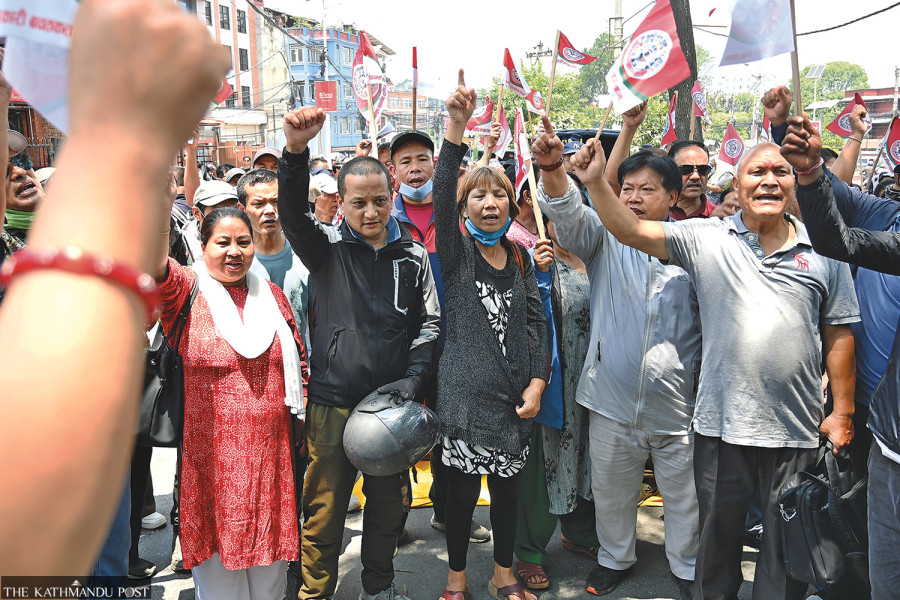National
Back to streets, co-op victims ask coalition to honour past deals
Depositors scammed by cooperatives gather for the third phase of protests in order to recover their savings.
Purushottam Poudel
With past agreements between the government and the cooperative members on recovering their savings yet to be implemented, victims have returned to the streets for the third phase of agitation.
People swindled by the cooperatives have made recovery of their savings a major demand this time saying that the government failed to honour its past pledges.
“In order to put pressure on the government, we are holding protests across the country on Monday, a day before the government presents the budget for the coming fiscal year,” Kushluv KC, chairman of the National Campaign for Protection of Cooperative Depositors, told the Post.
In the first phase of protest, the victims reached a seven-point agreement with then-minister for land management, cooperatives and poverty alleviation Ranjita Shrestha. In the second phase, they signed an eight-point agreement with the incumbent minister Balram Adhikari. “As the government remains reluctant to implement the agreement, we’ve launched the third phase of protest,” said KC.
The first phase of the street movement started on June 3, 2023. As per the deal signed in the presence of then minister Shrestha, the ministry had to set up a Deposit and Credit Guarantee Fund to secure the savings of cooperatives depositors. The ministry also had agreed to proceed with establishing a credit information centre and a debt recovery tribunal to make the debt recovery process for the cooperatives quick and effective.
Three representatives of victims were inducted into the cooperative sector reform suggestion task force constituted by the government. Headed by Jaykant Raut, the task force had suggested a temporary moratorium on the registration of new cooperatives and their expansion until other measures to stabilise the sector are implemented.
The first agreement was to solve the cooperative problem by April but that could not happen, said KC. That was the reason the National Campaign for Protection of Cooperative Depositors launched the second-phase agitation in April.
Ganesh Parsad Bhatta, spokesperson for the Ministry for Land Management, Cooperatives and Poverty Alleviation, says the ministry is making structural changes to address the grievances of the depositors and the agreement reached with them earlier.
“Suggestions by the Cooperatives Reform Task Force will be incorporated, along with some structural reforms of the sector, in the government’s annual budget to be presented on Tuesday,” Bhatta told the Post. “Besides the matter of returning the money swindled by the cooperatives’ operators, various other issues raised by the cooperatives are in the process of being addressed.”
Bhatta claims that in order to return the money, the assets of cooperatives operators are being seized and their valuation is ongoing.
Purushottam Karki, spokesperson for the national campaign, however, does not agree with the ministry’s claims. Karki alleged that ministry officials always tell the media people and the cooperatives’ victims that they are going to resolve the problems soon, but the government has not done much.
“When we ended the second-phase protest, we had made a deal with the government to form an all-powerful commission including representatives from the Prime Minister’s Office, the home ministry, the finance ministry and the national campaign,” Karki told the Post. “But even after three months, the government is doing nothing to implement the agreement made with us.”
In the upcoming budget, the government should bring some relief programmes to address the problem of the cooperative victims, Karki demanded.
Kashiraj Dahal, immediate past chair of the Crisis-ridden Cooperatives Management Committee, stressed the need for an independent regulatory body to address the problems in the cooperatives sector.
“An all-powerful commission is needed to look into the issue, one that can even direct state agencies to arrest someone if necessary,” Dahal told the Post.
Cooperatives managers are found to have embezzled about Rs200 billion from depositors. Fifty-four big cooperatives alone have misappropriated around Rs160 billion.
Malpractices in the cooperatives have been reported for over a decade. Investigations by various committees have concluded that turning the cooperatives into business ventures involving family members and close relatives, improper lending practices and excessive investments in real estate expecting quick and high returns are the major causes of their problems, Dahal said. The Oriental Cooperatives bankruptcy in 2013 was one of the largest and worst cases.
Of late, Deputy Prime Minister and Minister for Home Affairs Rabi Lamichhane and his former business partner GB Rai are linked to the cases of embezzling millions of rupees of multiple cooperatives. Lamichhane, who was a mediaperson before joining politics in 2022, is accused of rerouting the co-operatives’ money to the Gorkha Media Network to operate the now dysfunctional Galaxy 4K Television.
The main opposition Nepali Congress has been demanding a parliamentary committee to probe Lamichhane’s alleged involvement and other cooperatives frauds. The party has been obstructing parliamentary proceedings demanding assurances that such a committee wouldn’t spare Home Minister Lamichhane. But the ruling parties have been denying such a panel the mandate to specifically probe Lamichhane in the scam.
According to the Financial Sector Stability Review Report of the International Monetary Fund released in October last year, there are an estimated 30,879 cooperatives in the country, including 14,484 savings and credit cooperatives.
Over seven million people are connected to the cooperatives, and 94,000 people are employed in the sector. It has contributed significantly to the national economy.
As one cooperative after another failed to return money to the depositors, people from across the country resorted to protests. Those from all walks of life—from street vendors to small retail shop owners to farmers—have been victimised by fraudulent transactions.




 13.12°C Kathmandu
13.12°C Kathmandu














